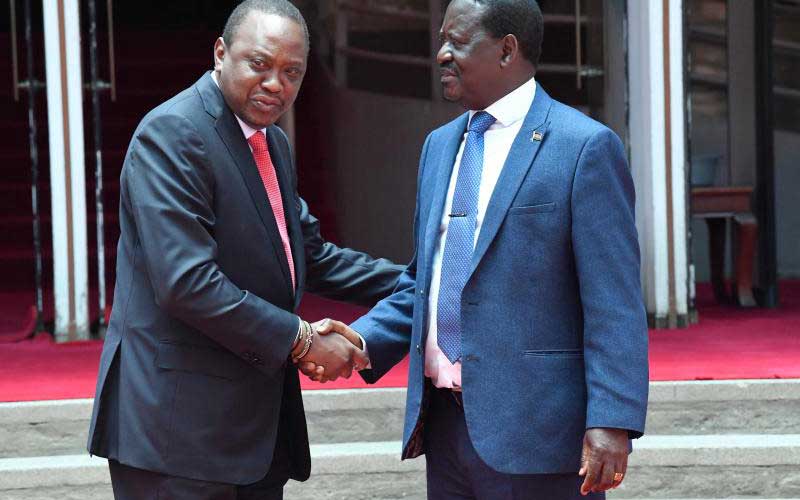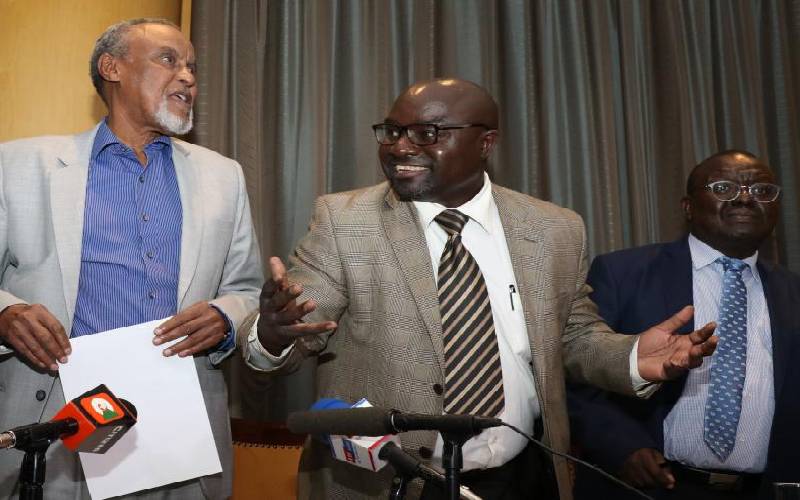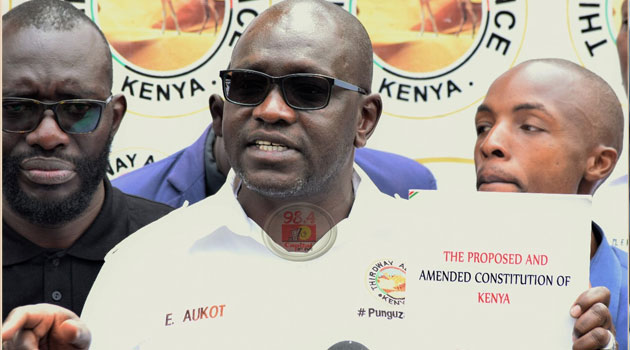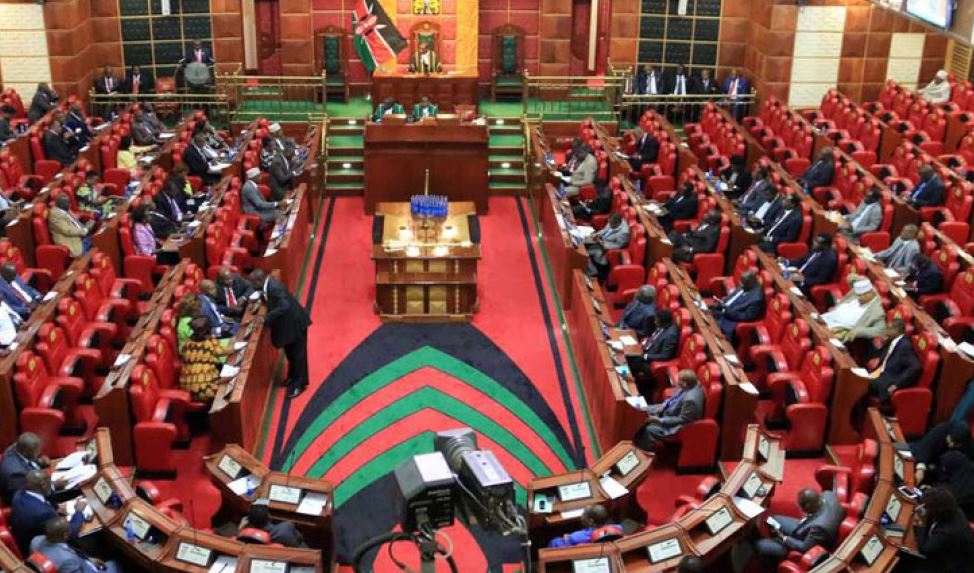By Canon Francis Omondi
“To the man who only has a hammer, everything he encounters begins to look like a nail,” Abraham Maslow.
Referendum for constitutional change is imminent. Our propensity to revert to legal solutions for Kenya’s political problems or moral dilemmas concerns me. Since it is demonstrable that changing constitutions rarely yields the difference we wish for, must we always tinker with our laws to fix our politics?
Seldom have we delved into successes political solutions afford us. We acknowledge the “handshake” of March 9, 2018, swerved Kenya away from the edge of the precipice of chaos. It took intriguing political turns and twists to cut the deal. Inclusivity! The courageous turns by President Uhuru Kenyatta and Hon. Raila Odinga, and the twist, and cryptic yet surprising pact somersaulted their lost and bewildered supporters into alignment in the new arrangement. So, Kenya is at peace today, after a grueling duel of the 2017 election, through a political solution. But there is a strong sign that President Kenyatta and Hon Raila are threading the needle to solidify the handshake by anchoring it in the constitution and inevitably force a referendum on us. They should have stayed on this path and never have capitulated. What a window of opportunity, not only to engrave an alternative approach to resolving our political complications but also still to transform and sanitize our politics.

President Uhuru Kenyatta and Opposition leader Raila Odinga on during the famed March 9, 2018 handshake. [File, Standard]
The obtuseness with which this referendum is being mooted is worrying. Unlike the early 1990s, we knew the reason for the referendum. “Repeal section 2a” (the section that made Kenya a one-party state). This precipitated the multi-party politics dispensation. Again in 2002 and after, Kenyans were clear. The push was to overhaul the independent constitution to reflect our realities. The changes sought included bringing the voices hitherto on the margins to the center and to institute a dramatic shift of how to share power and resources. Genuine inclusivity. For this, we found the formula in a devolved structure of government, which guaranteed “Bill of rights” among other measures to enshrine the rule of law. We promulgated the Constitution of Kenya 2010 (CoK 2010).
PROPOSALS FOR CHANGE OF LAW
We are living in an enchanted country, under a spell of the referendum for a change of law. The National Council of Churches of Kenya (NCCK) made a proposal mainly seeking to change the executive, which appears to voice certain politicians’ whispers. The NCCK is seizing the moment to inject in the constitution some issues they could not include during the last referendum. In their Executive Committee meeting of 27th February 2019, they reached the conclusion to propose a wide range of changes to the CoK 2010.
They suggested amending Article 130 of the 2010 Constitution by inserting the words “Prime Minister”, and “two Deputy Prime Ministers”, immediately after the words “Deputy President”. They also recommended inserting a new clause (3) to read: “130 (3) The President, Deputy President, Prime Ministers, and Deputy Prime Ministers, shall all be from different ethnic groups”. They recommended giving both the Prime Minister and Deputy Prime Ministers executive authority. NCCK also recommended amending Article 131 (1) (b), by inserting the words “Prime Minister and Deputy Prime Ministers” immediately after the words “Deputy President”. They reasoned that introducing the Prime Minister and Deputy Prime Ministers, as members of the National Executive will enshrine greater inclusivity in the government’s structure. The Prime Minister, Deputy Prime Ministers, and Cabinet Secretaries are to be accountable to both the President and Parliament by amending Article 153 by a. Inserting in Clause (2) the words “Prime Minister, Deputy Prime Ministers” immediately before the words “Cabinet Secretaries” and b. Inserting in Clause (2) the words “and Parliament” immediately after the word “President”.
Reforming the executive structure is evidently the thrust of their recommendations.
The NCCK conducted several seminars at the grassroots to garner up support for the referendum. But in many places, the membership refused to drink this “cool-aid”. They rejected the recommendations to amend the CoK 2010.

Building Bridges Initiative chairman Yusuf Haji, vice chairman Adams Oloo and secretary Paul Mwangi after addressing the media in Nairobi. [Collins Kweyu, Standard]
Ambassador Francis Muthaura, former Head of Public Service, while making a submission during the Building Bridges Initiative (BBI), on 10th July 2019, suggested bold changes to the CoK 2010. Amb. Muthaura, rooted for a power-sharing government of the two protagonists, with Cabinet positions shared equally once in power, an arrangement reminiscent to President Kibaki and Hon. Raila Grand Coalition Government. He proposes that both the winner and the runner-up candidates in the presidential election share in a coalition government as the President and Prime Minister, respectively.
“Once the results of the presidential elections are announced by the electoral commission, the candidates having the highest number of votes and the second-highest number of votes will form a government of national coalition,” he said.
He further suggested that in Parliament, the president’s party will provide the leader of government business, while the prime minister’s party will provide the deputy leader of government business, and make it more consultative than the confrontational government.
The Third Way Alliance of Dr. Ekuro Aukot caught many by surprise when they got the Independent Electoral and Boundary Commission’s (IEBC) nod for a referendum. With over 1 million signatures, they had the people’s mandate for their reform bill, dabbed “Punguza Mzigo” Bill 2019.
At the core of the bill is relieving the public financial burden by trimming the government’s runaway expenditure. The proposed amendments aim at dealing a fatal blow to corruption and theft of public funds, redistribution of national resources at the ward levels, which is a shift from the constituency, as we know it today and rearranging presidential terms to only one, but for seven years. True to its name, “Punguza Mzigo” bill plans on drastic austerity measures in both government and legislature, which should spur economic growth, and percolate prosperity to ordinary Kenyans.
It is disingenuous of Dr. Aukot, one of the Committee of Experts, who birthed the CoK 2010, to now propose to overhaul it. Reducing the number of legislators undermines the key gains of the CoK 2010, on the principle of representation. The rationale for the present arrangement outweighs the populist reasons of cost savings of taxpayers’ funds. This is sheer populism, that won’t remedy the appalling state of the masses. Why change the law, when these changes are achievable through fiscal discipline and robust economic policies?

Thirdway Alliance leader Ekuru Aukot urged county assemblies to adopt the draft Bill saying proposals made in will entrench devolution/CFM – MOSES MUOKI
I am skeptical that changing laws to expand the government for inclusivity, either as advocated by the NCCK or Amb. Muthaura reaches the depth of the issue. These proposals risk engraving tribal politics in our laws, which bred exclusion. What the NCCK suggests, will distribute executive positions based on one’s tribe, while Muthaura’s winner and runner-up sharing positions may tie the positions to same political groupings. Given how party politics in Kenya are tribally bent, this proposal may lead to an eternal exclusion of some communities. If we allow the changes as suggested, we would beget a bastard democratic order, with a government without checks and balances of an opposition. Doubtlessly, the changes will re-concentrate political power around a certain group in power and this will bury the CoK 2010.
We may assume the malaise is because of the defects in our institutions while the problem lies elsewhere. A sound constitution would need a corresponding sound “structure.” The Constitution of the Soviet Union also granted the Bills of Rights, but that did not prevent the centralization of power, in one person or in one party. And as soon as that happened the constitution was dead. The party or the chief became supreme. Even banana republics have sound constitutions protecting the bill of rights and inclusivity. But most of them end up being mere words on paper.
Addressing the US Senate Judiciary Committee, the late Justice Antonin Scalia refuted that the American exceptionality was in its constitution as many assumed. On the contrary, it was in the structure of its government; the independence of the judiciary and their bicameral legislature. In this system Scalia explains, “legislation passes one house [and] it doesn’t pass the other house; sometimes the other house is in the control of a different party; it passes both, and then this President, who has veto power, vetoes it. And they look at this and they say, ‘Ah, it is gridlock’”. This disagreement he observed is the key, that provides the check and balances, and this is exceptional of the American Constitutionalism.
There is a way inclusivity as in the “handshake”, or in the two proposals paid little attention to this kind of accountability, but blurred this vital element of democratic government. To their credit, “Punguza Mzigo Bill 2019” recognized the need to improve the checks and balances role of the Legislature. They propose reforming the legislature to increase the power of the Senate as the upper house and so improve the role of parliament as a government watchdog and people’s representative.
It is a cruel irony in using a referendum to achieve inclusivity. A referendum in its nature is divisive. Every referendum we have held left us divided: At first in 2005, it was “Banana” or “Orange” groups. Next, it split us between the “Yes” and “No” camps. We have observed a referendum sorely dividing the United Kingdom, between “Brexiters” and “Remainers”. In a referendum exists a tacit assumption that denounces those who are on the opposite side as enemies and this can lead to violence. With a referendum, we cannot walk the sensible middle of the road, or achieve compromise needed over complex social challenges, because it simplifies complex issues into sound bites. It hinders a thorough and factual debate over issues. Our leaders espouse referendums as a gauge of public approvals, while in reality; it is their tool to cause the public to parrot their untested idea.
The general tendency of a referendum is to inhibit an independent evaluation of issues against the general assessment of national interest by experts who would balance multiple interests. Further, it obstructs compromise by producing a result in which a majority, by any margin of votes, feel entitled to speak for the whole nation and the minority don’t count.
FIXING OUR POLITICS
So, investing more in politics than law remains our most viable option. During the BBC’s 2019 Reith Lectures In Praise of Politics, the retired Justice of the UK Supreme Court, Lord Jonathan Sumption, criticized the law’s expanding the empire into all our lives. He observed the law’s corroding influence on our democracy, advocating that politics and not law holds the solutions for the crisis in our society. He warns, “Every human problem or moral dilemma can’t call for legal solutions”.
Justice Sumption makes the case for strengthening the political process through representation, which is the role of parliament. For it is difficult for all citizens to vote over and decide over a matter. The masses often have insufficient data and information to reach an informed decision. Besides, as Sir David Hume, a prominent figure of the 18th century’s Scottish Enlightenment observed, there is an incurable narrowness of soul which makes people prefer the immediate to the remote and to avoid the promotion of parochial interests, over the national ones. Sumption, therefore, supports taking this process away from the electors who have no reason to consider but a desire for the immediate and narrow opinion of their own. He insists that political decision-making should stay in the hands of politicians because they can accommodate the widest array of opinions and act in the national interest.
It’s a tragedy that our lawmakers are strangers to this principle of representation. At best, they only listen to the concerns of the constituents but do not promote among their constituents a broader view of public interest.
James Madison, in The Federalist Papers, made the strongest justification for representative politics, which he argued, is to “refine and enlarge the public views, bypassing them through the medium of a chosen body of citizens, whose wisdom may best discern the true interest of their country, and whose patriotism and love of justice, will be least likely to sacrifice it to temporary or partial considerations.”

Kenya National Assembly Parliament Building Nairobi
Regrettably, our legislature operates as a creation of the executive, and or their political party heads. Nothing goes without their say so. Sir Edmund Burke an Anglo-Irish politician, political theorist, and philosopher who served as a member of parliament reminds us, “parliament was not a congress of ambassadors but its members were there to represent the national interest than the opinions of the constituents.”
We will remain torn apart by the submitted adjustments, unless these motions undergo a process of refinement and enlargement, through the broad workings of the legislative process. Here, such ideas are transformed from private persuasions at public hearings or at a local level, to the deliberative proceedings in Parliament. And from the contests and accommodation of interests in legislative committees to the representatives’ open declarations to their constituents.
Representation principle was intended to prevent such narrow interest and unjust views from determining public decisions. Thus makes the job of the representative is not to follow daily polls or sudden breezes in popular opinion, Madison taught, are too often the result of prejudice and partial interests. Rather, the representative is to promote a consensus grounded in justice and the common good.
The Kenyan ordinary political process is murky and treacherous, devoid of true representatives. Can we fix this? We must demand deliberation within the legislature of the proposals, by NCCK, Muthaura, Punguza Mzigo Bill 2019 and any others that will be put forward, and seek a two-way process of communication between the representatives and their constituents. Within this milieu of public communication and deliberation, perhaps a kind of civic education will take place. May this then contribute to forming and settling public opinion based on what is right, and therefore, justifies “the respect due from the government to the sentiments of the people.”
I opine that this madness to tinker with the code may become our “march of folly”. Mrs. Barbara W. Tuchman, in the March of Folly, gives a stark warning on decisions leaders makes, unwilling to listen to facts but end up harming the ordinary people. In some of her conclusions, she asserts that folly is sometimes caused by people’s ‘’wooden-headedness’’ or ignoring the earlier history. Just folly.
This is not a situation where leaders error in judgment from not knowing, but for a decision to be determined as a folly, Mrs. Tuchman sets out common three criteria that must be fulfilled. First, they warned those who were responsible before the potential for a disaster of what they were getting themselves into. Second, there were workable alternatives to the course they took. Third, it was groups, not individuals, who perpetrated the foolishness that suffered.
She supported her assertions with four major acts of folly in human history. These are the Trojans’ decision to move the Greek horse within the walls of their city; the refusal of six Renaissance Popes to arrest the growing corruption of their church and to recognize the increasing restiveness that would lead to the Protestant secession; the British misrule under King George III that eventually cost England her American colonies; and America’s mishandling of the conflict in Vietnam.
We must halt urgently this referendum march. For there is nothing new about our present crisis and the suggested constitutional reforms are usually irrelevant to the problem that provoked them. The peril of Kenya lay not in our laws or institutions, but in the decline of our character as a community. Without a powerful sense of community, even the best laws and institutions will remain a dead letter.
The facade will stand, but there will be nothing behind it. The Rhetoric will be loud, but it will be meaningless. And the fault will be ours.
Rev. Canon Francis Omondi is a Priest of the Anglican Church of Kenya, All Saints Cathedral Diocese, Nairobi. The opinion expressed here is his.
REFERENCES:
Barbara W. Tuchman. 1984: The March of Folly: From Troy to Vietnam. New York, Knopf
Jonathan Sumption. In praise of Politics: BBC 2019, The Reith Lectures: https://www.bbc.co.uk/sounds/play/m0005msd
James Madison. “Public Opinion,” December 19, 1791, in The Papers of James Madison, ed. William T. Hutchinson et al. (Chicago: University of Chicago Press, 1962), Vol. 1, http://press-pubs.uchicago.edu/founders/documents/v1ch2s26.html.
NCCK MEMORANDUM: Give Kenya a non-divisive Referendum. Press Statement on 27 February 2019.

